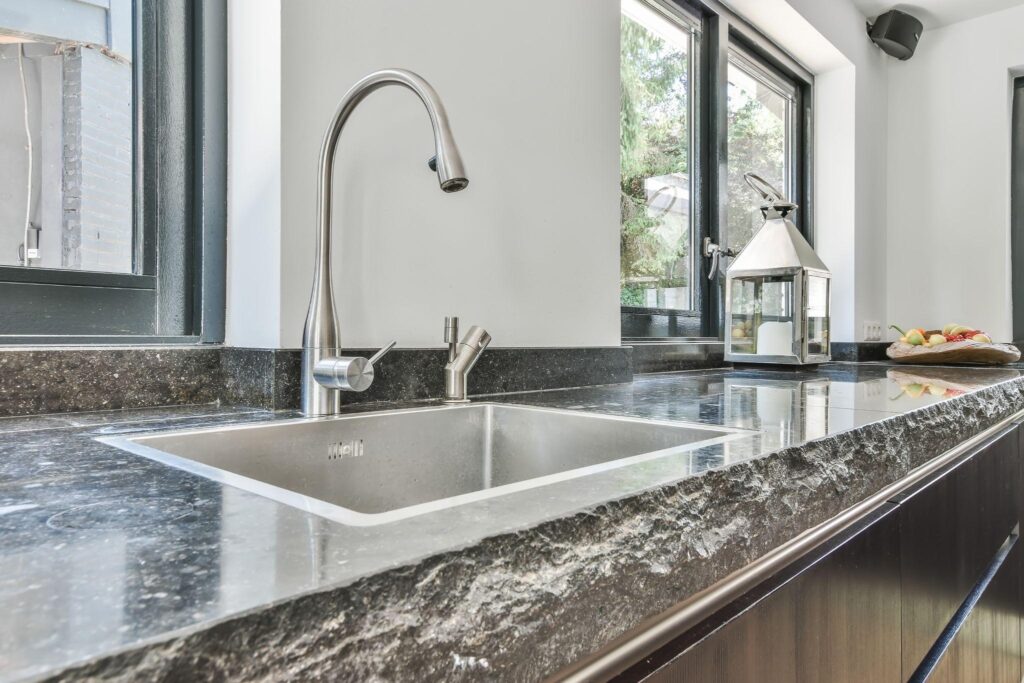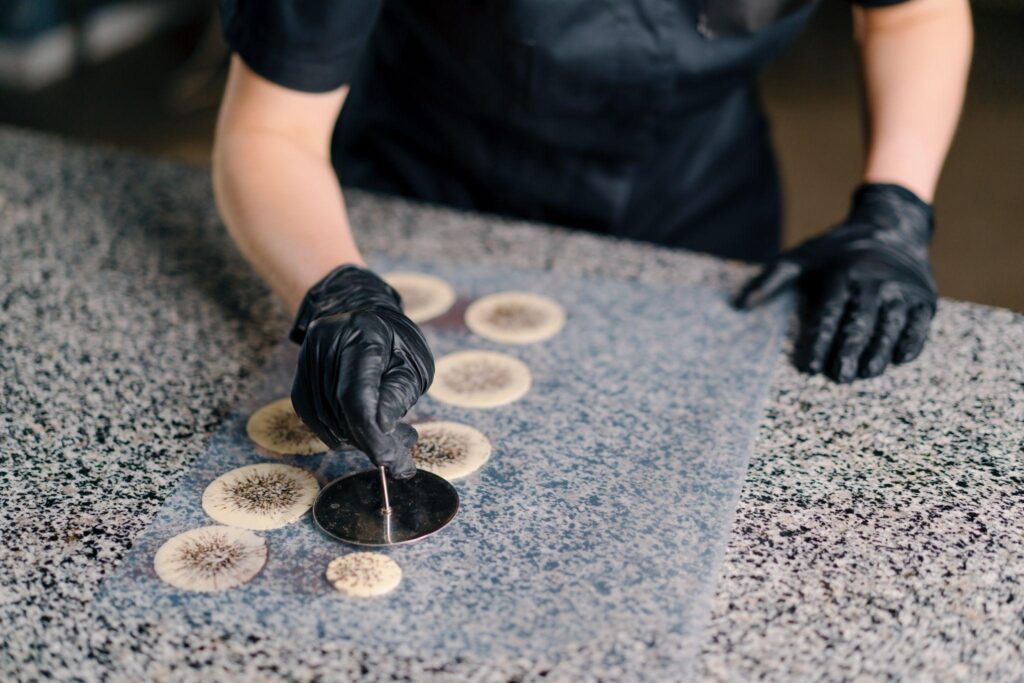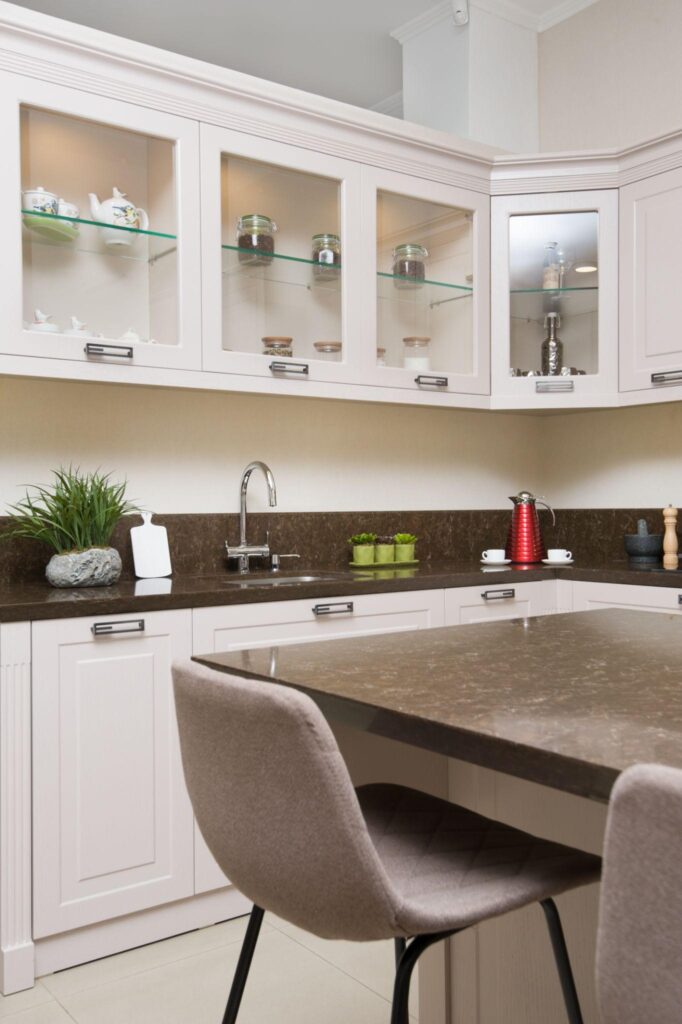Quartz countertops have become a top choice for homeowners seeking a blend of durability, aesthetics, and low maintenance, unlike laminate countertops in resilience and style. Known for their versatility and resilience, quartz countertops offer a luxurious look that rivals natural stone while providing practical benefits for kitchens and bathrooms. This comprehensive guide from Bath Brite explores everything you need to know about quartz countertops, including buying tips, costs, and care instructions, to help you make an informed decision.
What Are Quartz Countertops?
Quartz countertops, often referred to as engineered stone, are made from a combination of approximately 90-95% ground natural quartz and 5-10% polymer resins, pigments, and additives. This manufacturing process creates a non-porous, highly durable surface that resists stains, scratches, and bacteria. Unlike natural stone like granite or marble, quartz countertops are consistent in color and pattern, offering a uniform look that appeals to modern design preferences.
|
Interesting Fact Quartz is one of the hardest minerals on Earth, which is why homeowners choose it to enhance the durability of their quartz kitchen counters. |
Why Quartz: Advantages of Quartz as a Durable Countertop Material
Did you know that quartz countertops are recyclable? Yes, they are, and many manufacturers use recycled glass or porcelain pieces, which enhances the demand for quartz in the market. Well, that’s not all. Did you know that quartz can also resist germs? It is one of the many reasons why many homeowners choose it for kitchens and bathrooms.

Let’s have a comparative analysis of quartz characteristics with one of its strongest competitors: granite.
|
Feature |
Quartz Countertops | Granite Countertops |
|
Porosity |
Non-porous—resists stains & bacteria |
Porous—requires regular sealing |
|
Durability |
Highly scratch- and chip-resistant |
Durable but may crack under stress |
|
Maintenance |
Low-maintenance countertops |
Medium maintenance |
| Color & Design | Uniform quartz countertop colors |
Natural variations |
Thus, quartz is a low-maintenance countertop. Unlike granite, it does not need polishing or sealing. Where granite has natural elegance, quartz is more consistent in color and patterns. Talking about quartz countertop colors, how can we miss that it is available in hundreds of shades—from crisp white to deep onyx, speckled, or veined designs, you name it.

Quartz Kitchen Counters: Installation & Customization Guide
Custom quartz installation allows you to match your countertop precisely to your kitchen needs and aesthetic. For instance, if you need features like integrated backsplashes, waterfall edges, and sinks, quartz will go well with all.

Here’s how you should do a custom quartz installation for your kitchen countertop:
Template and Layout
Measure your kitchen and decide on the perfect layout to mock up the stone placement to minimize visible seams.
Fabrication
Then use professional tools to cut and polish the quartz material up to your specifications.
Installation
Then secure your thick quartz slabs and align them perfectly to get an expert-level countertop.
Quartz Countertop Cost Per Square Foot
We know the benefits and installation guide have somehow convinced you to get a quartz countertop installed. However, it’s important to have a look at the cost and price ranges as understanding pricing helps with budgeting:
|
Complexity Level |
Cost Range (US$ per sq. ft.) |
|
Basic quartz countertops |
$50–$70 |
| Mid-range engineered stone countertops |
$70–$100 |
| Premium/custom quartz slabs |
$100–$150+ |
Want to know the cost-influencing factors? Here you go:
- Quartz countertop colors (exotic shades cost more)
- Edge detail complexity
- Custom quartz installation features
- Local labor and supply costs
|
Interesting Fact Even though premium quartz may cost more, its low maintenance lowers the long-term expenses. It does not require any resealing or disinfecting chemicals. |
Maintenance & Care Tips for Quartz Countertops
|
Easy Daily Cleaning without chemicals Use a damp cloth with mild dish soap. No harsh chemicals or rough cleaning pads. |
Stain-Resistant Countertops
Quartz repels most stains, for instance, coffee, wine, and oils. Wipe them away with a soft cloth. |
Handle Heat Carefully
Although durable, quartz can be damaged by sudden heat. To prevent any damage, use trivets. |
No Cutting Directly on the Surface While scratch-resistant, quartz is not scratch-proof. Always use a cutting board.
|
Quartz vs. Other Countertop Materials
To determine if quartz is right for you, compare it with other popular countertop materials:
-
Granite: Natural stone with unique patterns but requires sealing and is prone to staining. Costs are similar to quartz ($50-$150 per square foot).
-
Marble: Elegant but porous and prone to etching and staining. More expensive ($60-$200 per square foot) and higher maintenance.
-
Laminate: Budget-friendly ($10-$40 per square foot) but less durable and prone to scratches.
-
Solid Surface: Seamless and repairable but less heat-resistant ($40-$100 per square foot).
Quartz stands out for its balance of durability, low maintenance, and design flexibility, making it a versatile choice for most homes.
Final Thoughts
Quartz countertops offer a perfect combination of style, durability, and ease of care, making them an excellent investment for kitchens and bathrooms. By understanding the buying process, costs, and maintenance requirements, you can confidently choose a quartz countertop that enhances your home’s value and aesthetic.
Whether you prioritize eco-friendly materials, modern designs, or budget-friendly options, quartz delivers unmatched versatility. Start exploring samples and quotes today to transform your space with this timeless material.
FAQs
1: Are quartz countertops heat resistant?
Yes, they can withstand everyday heat but can be damaged by very hot pots. It’s better to use a trivet.
2: Do quartz countertops stain?
No. They have a non-porous countertop surface with a highly stain-resistant quality that doesn’t absorb spills.
3: Can I install quartz countertops over existing surfaces?
It depends; if there’s too much extra height, it may affect doors. Usually, old countertops are removed first.
4: How durable are quartz kitchen counters?
They are extremely durable with their scratch-resistant, chip-resistant, and crack-resistant qualities.
5: Does quartz need sealing?
No, since it has a non-porous surface, it doesn’t require sealing, unlike natural stones